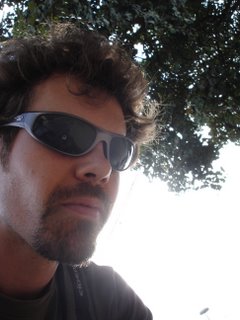 Star Trek (J.J. Abrams, 2009) (IMAX) Let's start with the good. I was a big fan of Star Trek: The Next Generation (TNG), and always had a soft spot for The Original Series (TOS), but I am far from a die-hard Trekkie, not having a single syllable of useful Klingon in my vocabulary.
Star Trek (J.J. Abrams, 2009) (IMAX) Let's start with the good. I was a big fan of Star Trek: The Next Generation (TNG), and always had a soft spot for The Original Series (TOS), but I am far from a die-hard Trekkie, not having a single syllable of useful Klingon in my vocabulary.Overall, however, I am enough of a fan to salivate at the idea of a new Star Trek movie despite all of the painfully bad screen time we have been subjected to (read: Star Trek V: The Final Frontier, Generations (gasp and shudder), and Insurrection) in hopes of once again experiencing the thrill that has embedded the franchise so deeply in western culture (read: Star Trek TNG, Star Trek VI: The Undiscovered Country (perhaps the best of them all), and First Contact).
The newest Star Trek outing predates all of the above in terms of chronology, and definitely outstrips many of them in terms of quality: J.J. Abrams, admittedly not a long-standing Star Trek fan, got a lot more right than wrong.
The interesting thing about Star Trek is that it is more about the characters than the stories or the technology. The movie begins in the days before Kirk was Captain and Spock was logic-bound first officer, and follows the events that forged the characters we know so well from TOS. Thus, getting it right for Abrams essentially means getting the right actors to inhabit the roles, something that, after much deliberation, I must say was well accomplished.
Chris Pine's turn as James Tiberious Kirk was the hardest for me to swallow. The brash, reckless, womanizing drunk was such an off-putting personality that I allowed my personal dislike to cloud my better judgement - I forgot how essentially vain, impulsive, and basically unlikeable William Shatner's Catptain Kirk was in TOS. As I have commented so many times before, the character may be essentially unlikeable, but may be serving the best interests of the film in being so - as is the case in Star Trek.
Zachary Quinto's Spock is a much more palatable incarnation for all of his crusty inflexibility. Quinto's task was no easy feat considering that he was starring opposite Leonard Nimoy in the flesh, and risked being overshadowed by the denture-wearing (according to DreamQueen) progenitor of the character. Instead we watch Quinto straddle the line between impulsive human and logical Vulcan in an entirely believable and endearing manner - we don't understand Spock's dilemma as much as Kirk's, but we definitely like him a lot more.
The rest of the menagerie is also well-represented:
- Uhura (Zoe Seldana) is portrayed with confident, modern sexuality that is in keeping with her 1960s incarnation, which seems muted by modern standards, but pushed the boundaries of propriety in its day by participating in television's first ever interracial kiss.
- Dr. McCoy (Karl Urban) is played sternly and seriously, and seems to miss a bit of the congenial humor that typified the original character. However, his role is far from pivotal in this film, and has room to mature. No complaints overall, save for Urban's overly strong resemblance of Matt LeBlanc of Friends fame...
- Chekov (Anton Yelchin) is played to a T measured against the TOS template, with the always enjoyable and seemingly perpetually young Yelchin punching his heavily-accented English for comic effect
- Sulu (John Cho) is also spot on by comparison to George Takei's 1960 portrayal - overly serious but steady as a rock. Sulu sees some action in this film, and that could foreshadow bigger things to come for his character in future outings.
- Scotty (Simon Pegg) is barely introduced in this film, but has all the Scottish brogue and sarcastic humor that one could want from the surly chief engineer.
I'd love to end on that positive note, but must say that there was one thing that bothered me about the newest Star Trek outing: the darkness of its mood/tone. This is best typified by - not surprisingly - the Romulon bad guys, who inhabit an oily black spaceship seemingly fashioned of ominous tentacles. There is nothing redeeming in the Romulons, who appear in this film as heavly tatooed, brutish humans rather than the more alien guise portrayed for most of their history.
Now I know I am usually looking for a darker and/or more serious edge to films that insist on the sun only shining on TV. However, in this case I could not help but miss the naive optimism of Star Trek TOS or even TNG. You see, Star Trek has always been the one sci-fi future that shows humanity having overcome war, famine, economic inequality and other base desires, emerging a still-flawed but entirely admirable creature.
Overall a small complaint against a wall of praise, and one that I will not insist on, as I do not want the new film to be held hostage to the standards of its long and storied history. And this, I think, is the point - the newest Star Trek, rather like the most recent Bond outings, was made for a new generation of fans that are not measuring it against its predecessors.
So neither will I.


1 comment:
Great review! I think Kirk's character is the only real throwback to the Star Trek that was quite clearly a product of the 1960s and its weird notions of masculinity, and that may be why he seems harder to stomach than other characters. But the thing about Kirk is that he's also kind of larger than life, in a lazy kind of way, and in spite of how far we've come...that's still kind of attractive.
Post a Comment